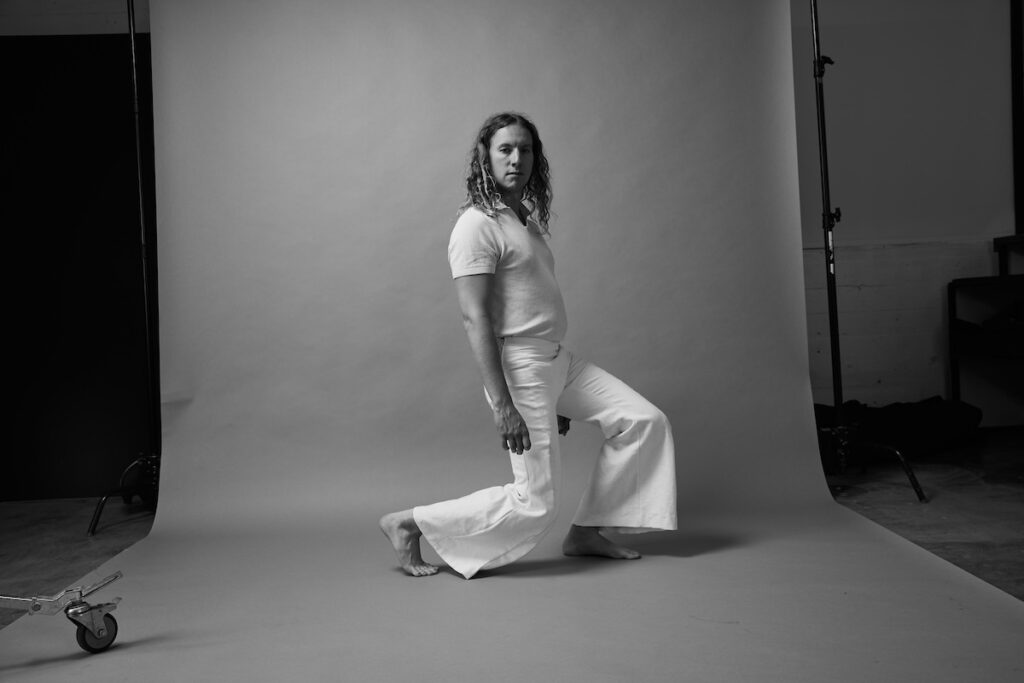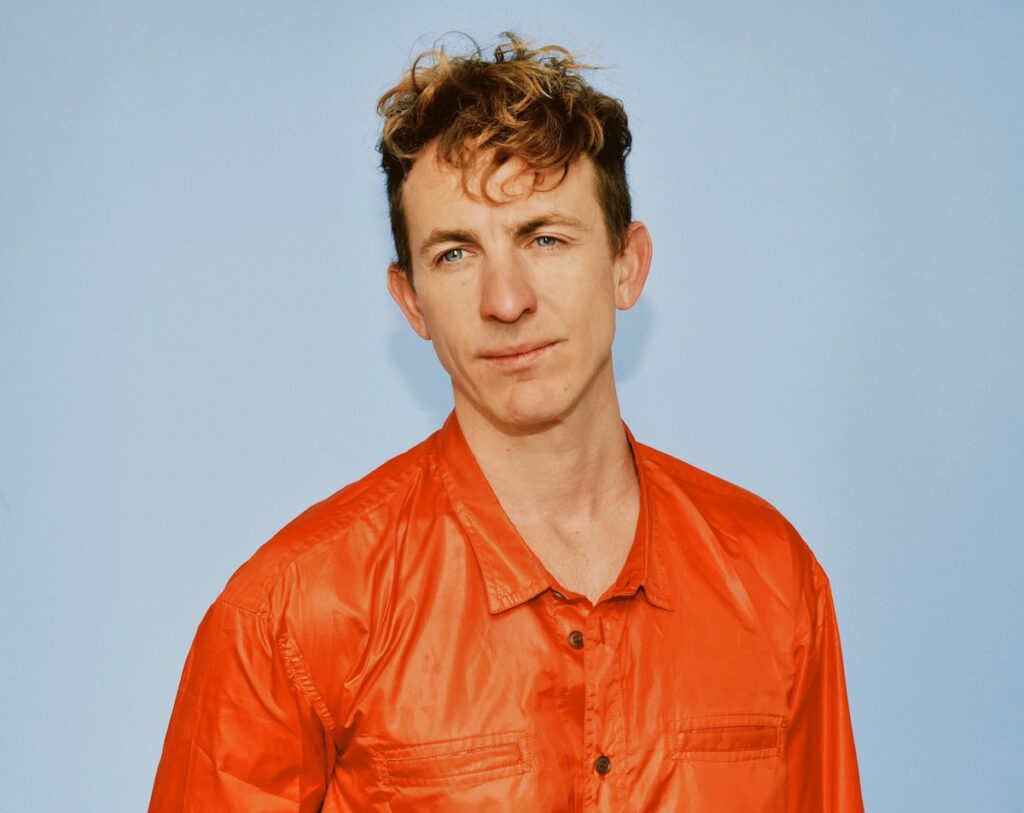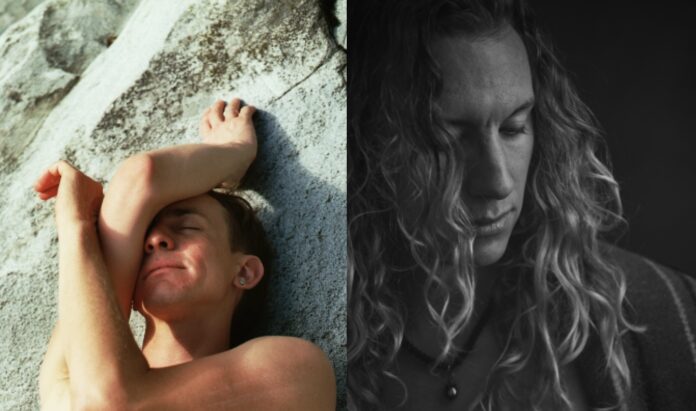If Noel and Liam Gallagher ever decide to reunite Oasis, they’d do well to follow the example set by brothers Buck and Dylan Meek. Best known as the lead guitarist for acclaimed Brooklyn folk rock band Big Thief, Buck’s upcoming tour in support of his masterful second solo album, Haunted Mountain, is slated to be a true family affair. Not only is the younger Dylan playing piano and synths in Buck’s band — he’s also serving as the opening act.
A graduate of New York City’s New School of Jazz and Contemporary Music, Dylan’s career has seen him record and perform with everyone from Post Malone to the Duke Ellington Orchestra. Tutored by jazz piano legend Jimmy Neely from a young age, Dylan’s own solo work includes his debut album, 2022’s All I Need, and a yet-to-be-released follow-up. Bay Area audiences will soon have two chances to hear some of Dylan’s forthcoming record when he opens for his brother at shows set for San Francisco’s Chapel on Fri/19 and Healdsburg’s Little Saint on Sat/20.
On a recent Zoom call, the Meek brothers sounded downright giddy as they detailed their plans to finally hit the road together. They include an original Nintendo 64 console as a vital provision, complete with Super Smash Bros., Goldeneye 007, and, as Dylan deemed it, “all the good stuff.” But in addition to destroying each other with fireballs during their down time, the Grammy-nominated brothers are also preparing to take their shared, lifelong affinity for music to the next level.
Speaking with 48 Hills from their respective homes in Los Angeles, Buck and Dylan Meek spoke about insights gained from their recent solo projects, the value of cliches, and the enduring power of mutual brotherly admiration.
This conversation has been edited for brevity and clarity.
………………
48 HILLS Haunted Mountain came out in October, but you recently released two additional songs: one a reworking and one that didn’t make it onto the album. In the note you shared to Instagram announcing those tracks, you write of “singing hog songs” and your grandfather’s earliest memory. Would you say sparks of memory and emotional warmth operate as this record’s connective tissue?
BUCK MEEK That’s definitely an element of my writing, both in general and on this record as well. I think it’s a synthesis of that, plus real-time emotional processing, and journaling. For me, songwriting is a form of journaling my experience. It’s a way for me to remember, both through literal documentation and by mythologizing my own experience, to some degree. It’s one way to remember, combined with anecdotes and stories and all the influences that have led me to become the person I am. I think the songs “Cuero Dudes” and “Beauty Opens Doors” were both homages to that: to my family and my friends that lived life before I was even born, but in ways that have shaped my own experience.
48 HILLS You’ve credited love and humility as themes of this record. In terms of what humility can offer as a practice, does that extend to live performance as well?
BUCK MEEK For me, every show is the same, no matter how big or how small the venue, even if it’s just the sound person in the audience. My first solo show I ever played in New York City was to just the sound person. There were literally zero other people there, and I was just as intimidated and humbled by that experience then as I am playing Radio City or whatever big venue I play with Big Thief. I think it comes down to whether you can even connect with just one person. Every single person in the audience is having their own subjective experience of that show, so trying to connect with them on a human level, I think, is super humbling if you’re honest with yourself about it. I feel like that’s a good place for me to approach a show from. It gives me energy, at least.
48 HILLS I had the honor of seeing Big Thief play with Lucinda Williams during your stop in Berkeley last summer. Was it as special to take part in that show as it felt to witness it?
BUCK MEEK Yes. That was such an honor. She’s been one of my songwriting heroes since I was a kid. I think that was the last show on that run with her, so we’d gotten to know her over the course of the tour, which was only a week or two, but it was that show where we finally got together backstage. We jammed in our green room with Lucinda for a couple of hours and worked a few things out. It was incredible. Her band—Doug Pettibone and Stuart Mathis—who joined us for our set are some of my guitar heroes as well.
48 HILLS Dylan, you spent three years putting your first album, All I Need, together, including playing nearly every instrument yourself. How has your relationship to those songs evolved since they’ve been released?
DYLAN MEEK Releasing that album, which I worked on for three years, was a spiritual release, an emotional release, and a psychological release. I put a lot of love, energy, time, effort, sweat, and tears into it. Putting it out felt like a bird in a cage having the cage open. I felt freer to fly. It was a concept album concerning love and the dynamics of love and my next album, which I’m dropping this year, is also a concept album of love songs, but it has more live elements and more rock elements in it. With the first album, I was a little more refined. I was holding back a little bit to fully express myself. With this next one, I’m still fully expressing myself, but finding myself as a producer.
BUCK MEEK It’s been so cool to see Dylan evolve between his two records. As a kid, Dylan focused mostly on the piano. He was a complete virtuoso as a teenager. He had this incredible teacher named Jimmy Neely, who was this older piano player from Harlem from back in the day who played with everybody. Dylan completely mastered the piano at a young age and it’s been so cool to see Dylan develop his relationship with production, with songwriting, and with recording himself and arranging super complex vocal arrangements. He’s also been teaching himself to mix at a very high level.

48 HILLS Do you know when that record might be out, Dylan?
DYLAN MEEK It’s ready to go but I’m still talking to labels and figuring out what’s going to happen. If I don’t get a label, I’m going to self-release again, like I did on the first record. If, for whatever reason, a label doesn’t approach me, I’m going to give everything I have into releasing my second child into the world.
BUCK MEEK I’ve heard a lot of his new one, and it is next level. He did part of it with a live band in the studio here in LA with Adrian Olsen as an engineer, who also engineered Haunted Mountain. He just moved here from Richmond and he’s an incredible engineer.
48 HILLS Buck, I was delighted to learn “Didn’t Know You Then” stemmed from a prompt to write a cliche love song. Fascinatingly, it’s the same premise Jenny Lewis utilized to pen “Love Feel” off her latest album. In Jenny’s case, it was a songwriting course being taught by Beck during lockdown. Are cliches an underrated form of inspiration?
BUCK MEEK Luke Temple, another of my songwriting heroes, taught a class through School of Song, which is a website my friends Steven Van Betten and Blue Sheffer developed. It’s this awesome website where they have working songwriters teach their own subjective methods. They’ve had so many great songwriters teach, including Robin Pecknold and Charlie Holland. Adrianne [Lenker of Big Thief] is doing one now. Luke’s first class was all about romantic love and how there’s now this taboo around it and its associated cliches and yet we’re all still moved by the idea, no matter how hip we are.
Then he gave us a handful of cliches, and we had to quickly write a song with them. I wrote the melody to “Didn’t Know You Then.” In the original chorus, I combined three cliches into “I’m nothing without you / with nothing to die for / my life is only waiting.” Just this super quick, codependent chorus, basically. It was a joke, for sure, to fulfill the homework assignment, but then I played it for my lady, and she blushed, and it felt good to sing, weirdly. It felt confessional. Even though I didn’t really believe in the words, the catharsis of singing something so open felt good. That was a bit of a wakeup call. I rewrote the words to be something that I could believe in, but I kept the melody and, hopefully, that feeling of being really open.
It’s fun to work with cliches. I really enjoy the process of taking a cliché—something universal—and then twisting it and trying to carve away the associations. The cool thing about starting with a cliche is that there is a reason the cliche exists. There is a collective truth in all cliches, to some degree, across humanity, so it’s a good starting point. It guarantees that people will relate to it, and if you can remove the language that’s so obviously identifiable as a cliche, or twist it into something more personal or discreet, maybe you can achieve both saying something unique and tapping into something collective.

48 HILLS What’s it like to record and tour with your sibling?
BUCK MEEK It’s the best. We’ve played music together our whole lives, in different iterations. As little kids, we had a piano in the living room and Dylan took to it right away. I took to the guitar, so I never really played piano at all. Dylan has actually been shredding the guitar recently. He’s been getting deep into writing guitar songs, and we’ve started to play guitar together, which is a crazy feeling. My relationship with Dylan, musically, has been so attached to the piano that it’s been super psychedelic to play guitar with him. It feels like a different person in my brother’s body or something.
We’ve played in so many different iterations together. He’s played on all my records, but he’s also so deep in the jazz world and I’ve sometimes dipped into that with him. We used to have this regular gig in New York City at a cocktail bar, where we’d play ragtime and stuff for fancy cocktail lounge people. I’m excited to see how we continue to evolve as brothers in music over the course of our life. This is the first time we’ll be traveling together, which I’m really excited about. We’re going to bring our Nintendo 64, play some video games, share the car drives, and have a solid time together. It’s going to be fun to see the country together. I’ve traveled a lot already, so I’m excited to show him all my little secret spots.
48 HILLS Are we talking original N64 with the three-color hookup? Which games?
DYLAN MEEK We’re talking the analog OG, baby. We got Super Smash Bros., we’ve got Goldeneye 007, Mario Party — all the good stuff. As far as playing with my brother goes, it’s very organic. I know it’s not everyone’s experience, but it feels like a good family dinner. That’s what it feels like playing music with Alexander —
BUCK MEEK Alexander is my first name. Buckley is my middle name.
DYLAN MEEK — or Buck rather. It feels like we’re sitting down at a dinner table. That’s what it feels like to me: like we’re just hanging out and talking.
BUCK MEEK It’s cool because we have a lot of similarities musically, but also a lot of different focuses. Dylan is deep in the jazz world. He has such a crazy understanding of jazz composition and classical composition and chord substitutions and this super high-level stuff and playing with him really inspires me to reach for that level. With my songwriting, I’ve tried to write with a lot of chord substitutions and more complex stuff like key changes and time signature changes, and Dylan definitely inspired a lot of that too.
DYLAN MEEK Buck inspires me tremendously as well. He’s had a huge impact on me, especially as a lyricist, as a songwriter, and as a guitarist. He’s been an amazing guitar teacher for me. As a songwriter and lyricist, I almost feel nervous to show him my lyrics because he’s such an amazing lyricist. I always bounce ideas off him and he always has the best criticisms and input for me. He knows how to communicate, and he’s pushed me to be a better lyricist. My next album has more songs that are a lot wordier, which was inspired by Big Thief and stuff.
BUCK MEEK WITH DYLAN MEEK 8pm, Fri/19. The Chapel, SF. More info here.
BUCK MEEK WITH DYLAN MEEK 7pm, Sat/20. Little Saint, Healdsburg. More info here.






